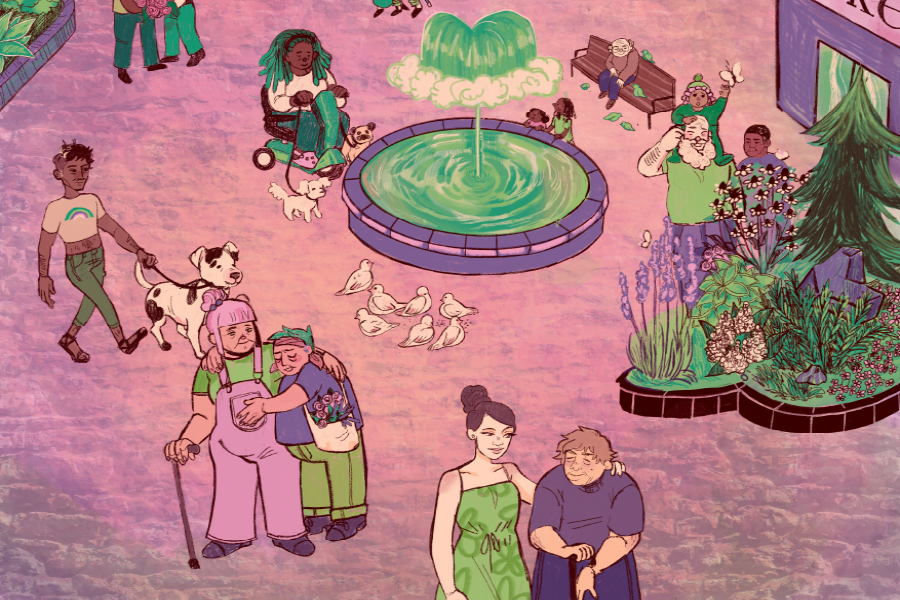
While Minnesota is generally seen as a great place to age and live well, not all communities experience the same level of support. One such group is LGBTQ older adults, who came into adulthood at a very different time in the U.S. than today’s young adults and have unique experiences and needs as they age. To gain insight into these experiences, the University of Minnesota’s Northstar Geriatrics Workforce Enhancement Program and Rainbow Health conducted research for the 2022 LGBTQ Aging Needs Assessment.
A team of ten researchers from the collaborating organizations conducted the survey with support from a Minnesota Department of Human Services Live Well at Home grant and the federal Health Resources and Services Administration. The report continues research from 2002 and 2012 and illustrates how societal changes and community work have affected the concerns and perceptions of the aging LGBTQ community.
“This year marks a major milestone, passing over one million older Minnesotans, defined here as 50 years old and above, in our state,” said Rajean Moone, Ph.D., study lead for the University of Minnesota team and faculty director for long-term care administration in the U of M’s College of Continuing and Professional Studies. “Older Minnesotans today are more diverse than they have ever been. Our study provides critical insights into a subgroup of this population who are often overlooked as they age—LGBTQ older adults.”
With outreach help from community collaborators, 485 individuals responded to the survey either online or by paper. Of those, 354 met the inclusion criteria of geographic region (Minnesota-based ZIP code) and age (50 years old and above) and are included in the results.
Possibly one of the most striking changes the study identified in the last decade is that 85% of respondents were confident that they would receive culturally sensitive services, such as family planning and sexual health screenings, while in 2012 only 18% and in 2002 only nine percent expressed the same confidence. Additionally, respondents continue to desire services that are welcoming but serve all older Minnesotans, including non-LGBTQ peers, rather than ones that only serve LGBTQ older adults.
The study also found, compared to the general population, LGBTQ older adults are more likely to live alone and serve as a caregiver. They are less likely to have a caregiver, have children or feel they have enough close friends. Given what we know about how these factors impact aging, LGBTQ older adults are at higher risk for social isolation and nursing home placement.
Though there having been major improvements in some areas, there remains much work to be done, especially in supporting BIPOC and transgender elders, people living alone and caregivers.
“Knowing that 42% of gay men in our study live alone, and 37% of bisexuals, more work has to be done to reach out to our solo older adults,” said Maren Levad, Rainbow Health’s principal investigator and an aging advocate for Rainbow Health. “That’s why we are so excited about programs like the first Twin Cities Elder Pride Brunch, happening June 25, which is a chance to bring our community together to celebrate and reconnect after two very tough years.”
The research team wishes to thank the community collaborators that distributed the survey to participants and the individuals who participated in the survey for making this project possible. Some of the collaborators include AARP Minnesota, East Side Neighborhood Services, Hope House, Little Brothers Friends of the Elderly Minnesota Leadership Council on Aging, Minnesota-North Dakota Chapter of the Alzheimer’s Association, Out in the Valley, Prime Timers Minneapolis-St. Paul, Ramsey County, Senior Community Services and Southeast Seniors Trellis.
-30-
About the Minnesota Northstar GWEP
The purpose of the Minnesota Northstar Geriatrics Workforce Enhancement Program is to improve the health and healthcare of older adults across Minnesota. It is supported by the Health Resources and Services Administration (HRSA) of the U.S. Department of Health and Human Services (HHS), the primary federal agency for improving health care for people who are geographically isolated and economically or medically vulnerable. The contents are those of the author(s) and do not necessarily represent the official views of, nor an endorsement, by HRSA, HHS or the U.S. Government. The Minnesota Northstar GWEP is also supported by the Otto Bremer Trust, the University of Minnesota Medical School and the Office of Academic Clinical Affairs.
About Rainbow Health
Rainbow Health envisions a Minnesota where people from diverse gender, sexual and cultural communities experience health and wellness in powerfully inclusive environments. Formed by the joining of Minnesota AIDS Project and Rainbow Health Initiative, our mission is to lead the work to achieve health equity for diverse gender, sexual and cultural communities. Learn more.
- Categories:
- Health
- Health conditions
- Research




